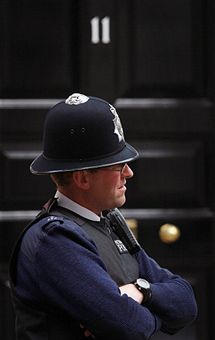 The police are more Thin Blue Line than The Sweeney. Her Majesty’s Inspectorate of Constabulary has found that 15 of 22 police authorities perform
‘adequately’, which is defined as meeting ‘most of the minimum requirements of the specified role…they were most effective at dealing with local short-term policing
priorities’.
The police are more Thin Blue Line than The Sweeney. Her Majesty’s Inspectorate of Constabulary has found that 15 of 22 police authorities perform
‘adequately’, which is defined as meeting ‘most of the minimum requirements of the specified role…they were most effective at dealing with local short-term policing
priorities’.
More worrying, with forces facing 20 percent cuts: only 4 authorities were judged to have set clear strategic direction and ensured value of money. Worse still, the report found that: ‘In just over half of the police authorities inspected, there is little or no account made of the delivery of efficiencies or workforce modernisation’. These administrative shortcomings are adversely affecting operations, the report suggests.
It’s the standard refrain: a public service rendered inert by its own stupendous and ill-defined administrative fabric. Over the course of 30 years, chief constables and commissioners have been subjected to 150 new duties by 57 pieces of legislation (Pg. 14, figure 1). And the last legislative act to delineate the morass of responsibilities was the 1996 Police Act. At the same time, the report finds that the police have never been less publicly accountable for the money they spend. HMIC welcomes the proposed introduction of elected police commissioners. It hopes that the policy will clearly define the roles of the chief constable and the commissioner, which will aid operations and simplify administration, therefore saving money. Elections will guarantee accountability for service delivery and give value for money.






Comments